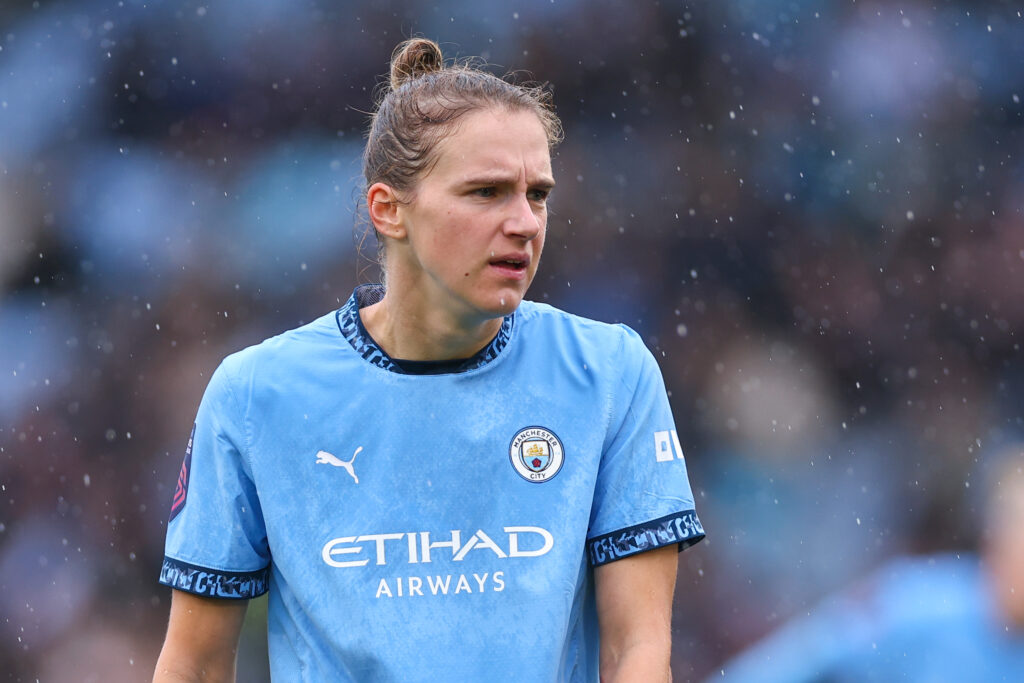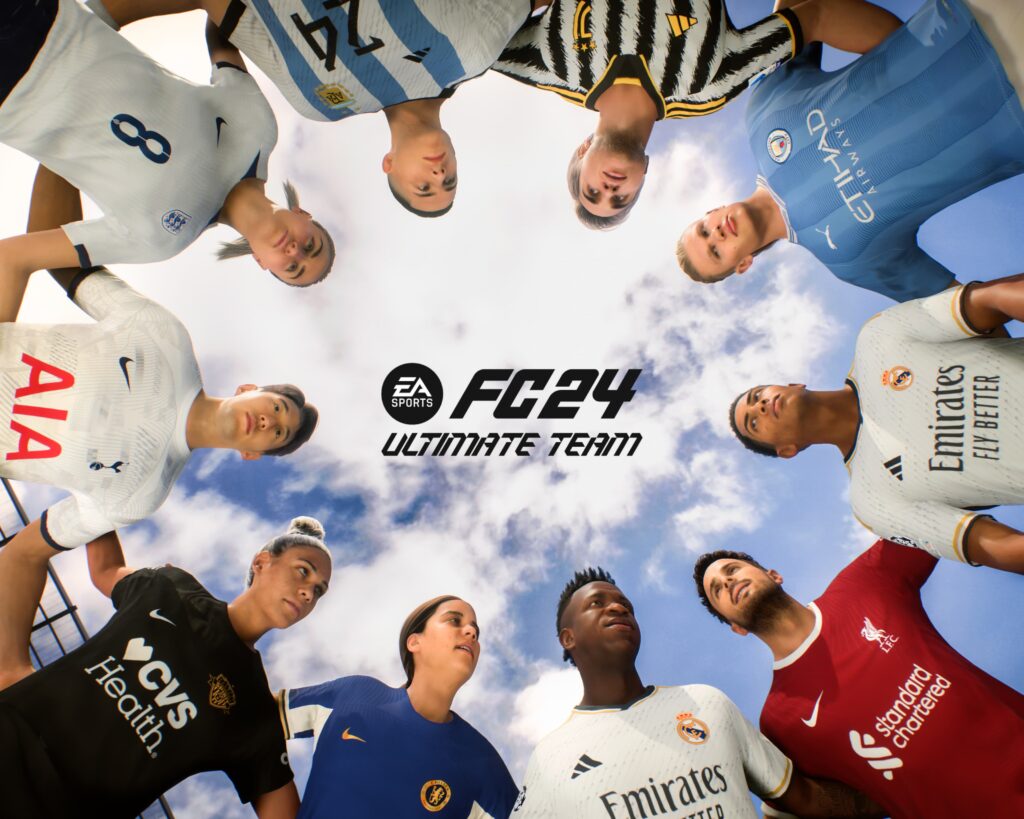The 2027 Women's World Cup has officially claimed its calendar spot, with FIFA announcing Tuesday that the tournament's Brazil-hosted 10th edition — the first-ever in South America — will run from June 24th through July 25th.
"The FIFA Women’s World Cup Brazil 2027 is already taking shape and we can’t wait for the opening match," said FIFA president Gianni Infantino.
Looking to break 2023's record-setting attendance and viewership numbers, Infantino also noted, "This historic tournament will have a massive impact not only in South America, but around the whole world, taking the women's game to the next level in terms of participation and popularity."
Prepping for the 2027 World Cup qualifiers
The international soccer governing body also allocated the competition's 32 available spots, with CONMEBOL's Brazil earning automatic entry as one of the three slots granted to the continental confederation.
UEFA leads the pool with 11 teams, followed by AFC with six, CAF and Concacaf with four each, and OFC's one.
The final three squads will be determined by a 10-team, two-round play-in tournament taking place in late 2026 and February 2027.

The road to Brazil kicks off in 2025
With details including host cities and venues still to come, the road to the 2027 World Cup is ramping up with qualifying matches looming just around the corner.
Next year's UEFA Nations League play will determine the 11 European teams bound for Brazil, including 2023 world champions Spain. Meanwhile, the path to a fifth star for the world No. 1 USWNT crest begins with Concacaf W Qualifiers in late 2025.
Similarly, 2025 qualifying matches for the 2026 AFC Asian Cup and 2026 Africa Cup of Nations kicks off World Cup entrances for teams in those federations. CONMEBOL will look to the 2025 Copa América tournament to determine the remaining two entrants that will compete alongside host Brazil, while OFC is likely to set their World Cup qualifying matches for next year.

Superstar exits pave the way for new World Cup stars
Both expected and surprise entrants will book their 2027 World Cup spots over the next two years, but the Brazil tournament's sidelines are already set to feature fresh faces after a flood of soccer greats called game in 2024.
The host nation will compete in their first World Cup since 1999 without legendary attacker Marta, whose 17 goals lead the tournament's all-time scoring list.
Canada is suffering the same fate with 2027 marking the first edition in 28 years without leading international goalscorer Christine Sinclair.
Two-time trophy-winners Germany — the only team other than the US with more than one world title — recently bid adieu to star Alexandra Popp, who retired as a four-time World Cup competitor.
As for the USWNT, they'll look to follow their 2024 Olympic gold medal with a 2027 World Cup title, but without star striker Alex Morgan, defender Kelley O'Hara, or goalkeeper Alyssa Naeher, who followed 2023 retirees Megan Rapinoe and Julie Ertz out the door this year.
More than 125 women's soccer pros signed an open letter to FIFA earlier this week urging the international governing body to end its recently announced four-year sponsorship deal with state-owned Saudi oil and gas company Aramco, calling it "a middle finger to women's football."
Prominent signees include Dutch striker Vivianne Miedema, Canada captain Jessie Fleming, and USWNT legend Becky Sauerbrunn. The players' letter cites Saudi Arabia's concerning human rights record, particularly when it comes to women and the LGBTQ+ community. It also called out the impact of oil and gas production on climate change as reasons to cut ties.
For her part, Sauerbrunn specifically named individuals imprisoned by the government.
"We’re standing alongside women like Manahel al-Otaibi and Salma al-Shehab who the Saudi regime has imprisoned simply for peaceful expression of equal rights," she stated.
"The safety of those women, the rights of women, LGBTQ+ rights, and the health of the planet need to take a much bigger priority over FIFA making more money," she continued.

FIFA's deepening Saudi ties concern women's soccer athletes
The partnership with Aramco is simply the latest in Saudi Arabia's investment into FIFA and the sports world in general. The kingdom, which has often been criticized for its widespread sportswashing practices, is imminently expected to be named the men's 2034 World Cup host.
FIFA responded to the players' letter on Monday, calling itself "an inclusive organization." The governing body leaned into the fact that the revenue from its partnerships are reinvested in growing women's soccer.
That reinvestment isn't enough to justify the ethical concerns, according to Miedema. "This is what we don’t want to stand for and accept within women’s football," the Manchester City star added.
"It’s simple: This sponsorship is contradicting FIFA’s own commitments to human rights and the planet."
On Friday, EA Sports released FC 25, the latest edition of the company's best-selling soccer video game — now with increased playability and storytelling on the women's side.
For the first time in history, EAFC — formerly known as FIFA — is throwing Women's Manager and Player Career Mode into the mix. In Career Mode, players now have full access to 2024/25 rosters across the world's top women's leagues: NWSL, WSL, Première Ligue, Frauen-Bundesliga, and Liga F plus UEFA Women's Champions League.

"It's been a few years since they've been implementing women into the game and I've had a presence in this community," Gotham forward Midge Purce told JWS at Thursday night's FC 25 launch party in New York City. "It's been fun to see that presence grow in a really authentic way. For the first time ever, women have Career Mode and that's a really sick addition that you wish came from the beginning, but it's really nice that it's being added now."
According to EA Sports, Women's Career Mode features all the same detailed capabilities as Men's Manager Career Mode, but also incorporates "unique challenges that exist solely within the women's game."

FC 24's Ultimate Teams paved the way for Women's Career Mode
Last year, FC 24 introduced women's football athletes into the brand's popular Ultimate Team mode. This addition allowed users to create their dream squads with both current stars as well as titans of the game like Mia Hamm and Kelly Smith as well as comic book-inspired "Women's Heroes," or stylized versions of real-life legends like Sonia Bompastor.
This year's upgrade represents a significant shift in programming for EA FC, which ended its 30-year partnership with international soccer's governing body FIFA after the game's 2023 release. The success of 2024's Ultimate Team inclusion likely preempted EA Sports' decision to expand women's soccer offerings to Career Mode. In addition to the managerial track, FC 25 users can also start a career on the pitch, following a player from team to team as they build skills via training and gameplay.
"The key thing that we wanted to do was present the women's career authentically, and make it feel like it really was, not just like men's career with women players," EAFC 25 design director Pete O'Donnell told reporters at a July 2024 preview event. "A lot of the systems behind the two mostly work the same, but it's the financial models and other things that make a really big difference."

In FC 25, women's soccer stars are on par with the men
FC 25 is the second video game to feature a career track for athletes in women's sports, following 2K Sports' 2021 edition of NBA 2K.
However, NBA 2K's The W mode operates separately from the men's side, while FC 25 takes a more integrated approach, allowing users to transition from playing on a women's team to managing a men's team, while Ultimate Team also allows athletes from both men's and women's leagues to play on the same squad.
According to Purce, seeing women's soccer elevated to the same level as men's, even in video game form, can impact users long after they turn off their consoles.
"When you can see and play with other players, that's crazy — like there's [ACFC star Sydney] Leroux in the locker room," she said. "It just makes it easier for girls to be engaged in it in a way that we haven't been before.
"When I was younger I used to play what was known as FIFA, but I would've played more if there were women I could have played with. If I could've used [Japanese soccer icon Homare] Sawa, I'd have loved that. That would have been nuts."

EA FC's women's soccer offerings show broad appeal
And it's not just young girls taking advantage of EA FC's increased interest in the women's game.
In FC 24's first 24 days on the market last year, EA Sports released statistics showing that 357 million online Ultimate Team squads had at least one women's soccer star among their starting XI. Additionally, women's leagues accounted for four of the top 10 leagues in terms of representation across all online Ultimate Teams.
"My brother, who plays EA a lot, he'll call me and get really upset about my ratings, or he'll use me and be like, 'You just scored a goal!'" Purce continued. "To be in the conversation — where they do know you and they're either happy or upset — that's sports. In the sports world, it's more important to be in the space than anything else."
EA SPORTS FC 25 is now available on PlayStation 5, PlayStation 4, Xbox Series X|S, Xbox One, PC, and Nintendo Switch.
Brazil has been named the host for the 2027 Women’s World Cup, with FIFA announced early Friday.
The decision came after a vote at the 74th FIFA Congress in Bangkok, with Brazil earning 119 votes to the joint European bid’s 78.
This will be Brazil’s first time hosting the Women’s World Cup, with the country having hosted the men’s World Cup twice before in 1950 and 2014. It will also be the first Women’s World Cup held in South America. The tournament will follow the same 32-team format as the 2023 WWC in Australia and New Zealand.
Brazil winning the bid was not entirely surprising after FIFA issued a report just last week, stating that the Brazilian bid had pulled ahead as host following technical inspection. After evaluation, Brazil was given a score of 4.0 out of 5, compared to the 3.7 awarded to the Germany, Belgium, and the Netherlands.
Brazil ranked higher in a number of key areas, including stadiums, accommodations, fan zones, and transport infrastructure. Though considered to be a frontrunner, the US and Mexico withdrew their joint bid prior to the technical inspection period, saying they would instead focus their efforts on 2031.
On Friday, Brazilian Football Confederation (CBF) president Ednaldo Rodrigues called it a "victory."
"We knew we would be celebrating a victory for South American women's soccer and for women," he told reporters. "You can be sure, with no vanity, we will accomplish the best World Cup for women."
"We are working on a transformation, not only for the country but for the continent," added bid team operational manager Valesca Araujo.
Brazil intends to use 10 of the venues utilized at the 2014 men’s World Cup, including holding the final in Rio de Janeiro on July 25th. The CBF's proposal outlines that the 2027 tournament run from June 24th through the end of July. Last summer’s World Cup began at the end of July and concluded on August 19th.
Another notable element of Brazil's newly unveiled plan to grow of the women’s game is that "all [men’s] clubs wishing to take part in high-level national and continental competitions must now provide a structure for a women’s team." While the definition of "structure" was not specifically identified, the country has set targets with CONMEBOL to help increase the number of women’s club teams in the country.
In last week's inspection findings, FIFA noted that selecting Brazil as the next WWC host could "have a tremendous impact on women's football in the region."
FIFA has set the dates for the first edition of the Women’s Club World Cup.
The first Women's Club World Cup will take place in January-February 2026, with the 16-team tournament held every four years after that, FIFA said in Wednesday's statement. Initial plans to introduce a Women’s Club World Cup were revealed in May 2021 by FIFA president Gianni Infantino, who then called it was part of a plan to "revolutionize" the women’s game.
"It’s crucial, after the huge, huge success in Australia and New Zealand at the last [FIFA] Women's World Cup, where we had two million viewers in the stadiums [and] two billion around the world, that we build on that success to create new global competitions, because national team football is obviously based on club football as well," Infantino said following today's FIFA Council meeting, which occurred in advance of the 74th FIFA Congress in Bangkok.
🔘 Approval of the Women's International Match Calendar 2026-2029
— FIFA (@FIFAcom) May 15, 2024
🔘 First edition of FIFA Women's Club World Cup to take place in early 2026
🔘 Mattias Grafström formally appointed as FIFA Secretary General
All the key updates from today’s FIFA Council meeting in Bangkok:
The council additionally unanimously approved a new international match calendar with a focus on increased opportunities for rest and recovery for both players and coaches. The overloaded calendar in the women’s game has been a growing point of contention for players as the number of injuries — specifically ACL injuries — continue to rise.
Between summer international tournaments and delays due to the COVID-19 pandemic, certain European teams had to contend with the possibility of extremely condensed playing demands. That meant balancing workloads between the 2020 Olympics (held in 2021), 2022 European Championships, 2023 Women's World Cup, 2024 Olympics, and another Euros in 2025.
When England failed to qualify for the 2024 Paris Olympics in December 2023, captain Leah Williamson told the Telegraph that she and her teammates were actually a bit relieved to have the summer off.
"It's horrendous that one of the first things that popped into my head about the Olympics was, 'at least they'll probably all get another two or three years on their career now, because they'll get a summer off,'" she said. "Everyone needs a rest and now they'll get one.
"Nowadays we get to October and girls are saying, 'I'm tired,' because you're carrying so much from the previous season. We are driving ourselves into the ground with it, so some sort of solution needs to be found soon, in terms of the schedule, otherwise it's not sustainable."
It should be said that the international schedule doesn’t include club responsibilities. The NWSL season kicked off this year with a number of players sidelined due to injuries picked up while playing for their national squads. This was an issue for Gotham FC, whose coach Juan Carlos Amorós called out the international schedule after USWNT forward Midge Purce suffered an ACL tear after competing in the Concacaf Women's Gold Cup.
"We lost Midge during the game which for me is a bittersweet flavor," Amorós told reporters after Purce exited Gotham's March 24th match against Portland. "By the way, it’s another player that came from the Gold Cup. Last week, it was Debinha. We are paying the consequences of a tournament that shouldn’t have happened.
"We’re talking about protecting the players, [who shouldn't] go to play an international competition after one week of preseason. We’ve seen the consequences now. We’ve got Rose, Lynn, last week it was Debinha in Kansas [City] and now we have Midge. From my experience, the clubs are going to keep paying for that competition."
On Wednesday, Infantino said that rectifying the international match calendar is another step in enhancing the level of competition across the board.
"The Women's International Match Calendar and the subsequent amendments to our regulations represent an important milestone in our pledge to take the women's game to the next level by enhancing competitiveness across the world," he said.
"This calendar is such a critical tool to ensure we continue to drive global professionalization of women’s football," added FIFA Chief Women’s Football Officer Dame Sarai Bareman in a statement. "In many parts of the world, international football provides crucial top-flight playing opportunities for female players, and this is particularly the case in nations where domestic leagues are not yet fully professional. This calendar strikes a balance to enable the domestic and international games to grow side by side, while at the same time ensuring players will have more opportunities to rest, recover, and re-train between windows and following major tournaments."
Brazil has officially become the favorite to host the 2027 Women's World Cup after FIFA’s technical inspection team awarded them a higher rating than the joint European bid.
After the US and Mexico dropped out of the running last month, the bid from Germany, Belgium, and the Netherlands had previously been pegged to win hosting rights for the next Women's World Cup. But FIFA's latest report shows that Brazil was given a score of 4.0 out of 5 in its technical evaluation, besting the European contender's score of 3.7.
Brazil ranked higher in a number of key areas, including stadiums, accommodations, fan zones, and transport infrastructure. The country is aiming to reuse 10 of the venues used for the 2014 Men's World Cup in 2027, with the final set to take place in Rio de Janeiro.
"The Bid Evaluation Report reflects the comprehensive evaluation model that has become a hallmark of FIFA’s enhanced bidding processes for men’s and women’s flagship events, which incorporates a variety of criteria, ranging from event vision and key metrics, infrastructure, services, commercial aspects, and sustainability and human rights," FIFA wrote in a press release.
The report also highlighted the fact that this would be the first Women's World Cup in South America, noting that the decision could "have a tremendous impact on women's football in the region."
Should the EU bid win, it wouldn't be the first WWC in Europe, as Germany played host to the event in 2011 before France in 2019. There could also be further complications for the Germany-Belgium-Netherlands bid: In its report, the evaluation team regarded the bid's legal and contractual framework as "high-risk."
FIFA has promised more planning time for the 2031 Women's World Cup. While the Men's World Cup hosts have already been secured through 2034, the WWC is only three years away with a host yet to be named.
The final vote is set to take place at the 74th FIFA Congress in Bangkok on May 17th. It will be the first time FIFA determines a World Cup host via an open vote.
The United States and Mexico have withdrawn their joint bid to host the 2027 Women’s World Cup, per a Monday afternoon release from U.S. Soccer and the Mexican Football Federation.
According to the statement, they will instead focus on developing a "more equitable" bid for the 2031 tournament, with the ultimate goal of "eliminating investment disparities" between the men’s and women’s tournaments.
The federations went on to cite the upcoming 2026 Men’s World Cup in the U.S., Canada, and Mexico as an opportunity to build support for local infrastructure, improve audience engagement, and scale up media and partnership deals in preparation to "host a record-breaking tournament in 2031."
"Hosting a World Cup tournament is a huge undertaking — and having additional time to prepare allows us to maximize its impact across the globe," said U.S. Soccer President Cindy Parlow Cone. "Shifting our bid will enable us to host a record-breaking Women’s World Cup in 2031 that will help to grow and raise the level of the women’s game both here at home as well as across the globe."
The decision leaves just Brazil and a joint bid from Belgium, Germany, and the Netherlands in the running for the 2027 host spot. Brazil — the rumored frontrunner — has never hosted a Women’s World Cup, while Germany hosted the 2011 tournament as a solo venture.
Furthermore, this postponement doesn’t mean the U.S. is a shoo-in for 2031, as it's been previously reported that 2022 UEFA Women's EURO host England is considering their own Women's World Cup bid. FIFA is scheduled to confirm the winning bid after the FIFA Congress votes on May 17th.
Spain has topped the FIFA rankings for the first time, with the World Cup champions ascending to the the No. 1 spot.
Following the 2023 World Cup, Sweden topped the world rankings. But Spain followed up its World Cup win with a string of impressive performances in the Women’s Nations League to finally move into the top spot. The first-time World Cup winners are just the fourth team to ever hold the No. 1 spot after the USWNT, Germany and Sweden.
Spain took five wins in the Nations League – including two over Sweden – to qualify for the Nations League semifinals in February, when they will face the Netherlands.
The USWNT, meanwhile, is up to No. 2 in the rankings after falling to No. 3 in the aftermath of a disappointing World Cup run. France took moved into the third spot.
After missing out on the Olympics and finishing third in their Nations League group, Sweden dropped to fifth. Similarly, European champion and World Cup runner-up England – also out of the Olympics – dropped to fourth.
A record 192 nations now have been featured in the rankings, with Central African Republic and Macau appearing for the first time in the latest edition. North Korea, American Samoa, Madagascar and Bahamas have made a reappearance on the list.
Incoming U.S. women’s national team head coach Emma Hayes is among the three finalists for the FIFA Best Coach award.
Hayes was nominated for her work with English club Chelsea, marking her third time as a finalist for the award. With Hayes at the helm, Chelsea won the FA Women’s Super League for the fourth straight season and the FA Cup for the third straight season in 2023.
Upon the conclusion of Chelsea’s WSL season in May 2024, Hayes will join the USWNT as its manager.
Hayes is joined on the shortlist for the FIFA women’s coach award by England’s Sarina Wiegman, who led the Lionesses to a runner-up finish at this summer’s World Cup, and FC Barcelona’s Jonatan Giráldez. Under Giráldez, Barcelona won the Primera División, the Supercopa de España and the UEFA Women’s Champions League.
Among the 16 nominees for FIFA Best Player is Lindsey Horan, the lone contender from the USWNT. Spain and England each tied for the most nominees with four. Spain’s Aitana Bonmatí, who won the World Cup Golden Ball and Ballon d’Or, is among the nominees.
The award winners are set to be announced on Jan. 15 in London.
#TheBest FIFA Women's Coach Finalists! 🙌🎉
— FIFA Women's World Cup (@FIFAWWC) December 13, 2023
🇪🇸 Jonatan Giraldez
🏴 Emma Hayes
🇳🇱 Sarina Wiegman
Want to know more about the final three? 🧵👇
The U.S. Soccer Federation, in conjunction with the Mexico Football Federation, submitted a joint bid to host the 2027 Women’s World Cup on Friday.
The bid’s tagline is “NEW HEIGHTS,” which includes a collective vision to “deliver a tournament with the world’s greatest players playing on world-class pitches in sold-out stadiums.”
As part of the bid, USSF cites infrastructure that “is already in place – including training facilities, match venues, base camps and travel accommodations – to deliver an excellent on-field product and top-level performance throughout the entirety of the tournament.”
In a release, U.S. Soccer president Cindy Parlow Cone called it a “pivotal time for women’s soccer.”
“Around the world, Federations are beginning to invest more and more in the women’s game and records are being rewritten for revenue, viewership, and participation,” Parlow Cone said. “The U.S. and Mexico are in a unique position to host a World Cup that will leverage the same venues, infrastructure, and protocols used for the Men’s World Cup just a year prior.
“As a result, we believe the time is right to host a FIFA Women’s World Cup that features a truly world-class experience for players and fans, alike. This will not only unlock the economic potential of women’s soccer, it will send a message to young players around the world that there is no limit to what they can achieve.”
The U.S. is set to host the 2026 Men’s World Cup alongside Mexico and Canada. The bid for the women’s tournament will utilize “key efficiencies” from that event to help their iteration of the event.
U.S. Soccer had previously announced their intention to submit a bid alongside Mexico. Belgium, Germany and the Netherlands submitted their bid on Friday, the deadline to do so, as well. Brazil had previously submitted their bid.
South Africa had put in a bid, but withdrew it in November.
There are still some obstacles in the way of a World Cup being played in the U.S. and Mexico, though. The World Cup has never been hosted by a South American country, making Brazil a high-quality bidder for the tournament. Germany, meanwhile, hosted a World Cup in 2011 and splitting the games between three countries would provide the infrastructure needed for the tournament.